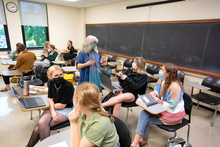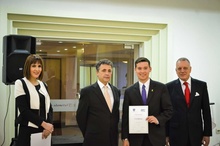Iowa Law has established its human rights program as a standout in a competitive and changing world, allowing its A+ rating for Human Rights Law from PreLaw Magazine, a National Jurist Publication to continue. The opportunities to learn and practice in this field are far reaching at the University of Iowa College of Law.
A large part of Iowa Law’s engagement with human rights is through the UI Center for Human Rights (UICHR). Established in 1999 by Iowa Law professor Burns H. Weston, Dr. Rex Honey, and Dorothy M. Paul, its core mission has been the promotion and protection of human rights at home and abroad through distinguished multidisciplinary leadership in human rights education, scholarship, and public service.
The center has been a unit of the College of Law since 2013 and is directed by Dean Adrien Wing, Iowa Law’s associate dean for international and comparative law programs and the Bessie Dutton Murray professor. Two Iowa Law alumni, Dr. Brian Farrell (98JD) and Amy Weismann (00JD), serve as the center’s associate and assistant director, respectively.
Since its founding, the center has continually adapted its work to the changing world - no small feat over the past two years.
“The global pandemic put the center’s work in a new perspective and presented unexpected challenges - and opportunities- for our human rights teaching, scholarship, and public service,” said UICHR Director Adrien Wing.
Historically, UICHR offered a robust schedule of speakers and conferences on the UI campus. In 2020, the center launched a series of public virtual webinars that have focused on human rights issues related to COVID-19, racial equity and injustice, American foreign policy, and human rights in Iowa. Over 5,000 people have attended and viewed the center’s programs since that time.
In 2021, virtual programming continued and allowed UICHR to reach more people through zoom events, live streams, and providing recordings of the events via their YouTube channel. The year kicked off 2021 with a series on Renewing the Human Rights Agenda, exploring human rights implications at home and abroad for the nation and the new administration. This fall UICHR presented on the human rights standards related to some of today’s most pressing issues faced in the U.S., Iowa, and our local community with the Iowa in the World Community series.
Currently, UICHR is celebrating the 20th anniversary of the One Community, One Book—a program created to educate the broader community on human rights topics through literature, keynotes, author keynotes, classroom visits, and strategic partnerships.

UICHR has also grown into an academic unit since its founding, particularly since its move to the College of Law in 2013. The center teaches undergraduate courses and offers UI’s Human Rights Certificate, an 18-semester hour interdisciplinary credential program for undergraduate UI students. The certificate provides a unique opportunity for undergraduates to take courses taught through the College of Law, and for certificate alumni to regularly pursue careers in human rights or attend law school after completing their bachelor’s degrees.
Each year, a number of students work with the center. Undergraduate students work through the Rex Honey Internship program which involves them in the center’s programs and research. Law students work through the law school’s research assistantship program under the supervision of center staff.
UICHR also works diligently to bring prominent speakers to Iowa. In the recent past, the center has cosponsored campus lectures by Professor Bryan Stevenson, Professor Anita Hill, Ambassador Susan Rice, and Michelle Alexander. In the past year, the center’s webinars have featured human rights experts including Dean James Anaya of the University of Colorado; UN Special Rapporteur on Trafficking in Persons and Irish Centre for Human Rights Director Siobhan Mullally; Emily Galvin Almanza of Partners for Justice; University of Chicago sociology professor Reuben J. Miller; and Melissa Upreti, chair of the UN Working Group on Discrimination against Women and Girls.
While the UICHR provides a substantial amount of human rights programming for Iowa Law students, the College of Law continues to incorporate human rights material through coursework and other experiential learning opportunities. Although Iowa Law does not offer a formal human rights concentration or track in its JD programs, its offerings are strong.
Human Rights courses offered at the College of Law include: Human Rights in the World Community with Professor Aaron Page; International & Comparative Labor and Employment Law with Professor César F. Rosado Marzán; Immigration Law with professors Stella Burch Elias and Bram Elias; International Environment Law with Professor Jonathan Carlson; International & Comparative Family Law with Dean Ann Laquer Estin; and Law in the Muslim World with Dean Wing. A number of faculty members regularly publish on human rights topics and actively participate in international professional associations and conferences.
The College of Law has four student run journals. Two in particular publish articles that often intersect with human rights issues. The Journal of Gender, Race & Justice addresses subjects often involving domestic human rights concerns and is ranked #7 in the category of Gender, Women and Sexuality and Law and #10 in Minority, Race and Ethics Issues and Law (W&L Law Journal Rankings). The Transnational Law & Contemporary Problems Journal directly addresses issues and problems that transcend national political boundaries, presenting to the international and comparative law communities matters not commonly found in the other journals. In addition, Iowa Law students regularly participate in the annual Iowa Human Rights Research Conference co-hosted by UICHR.
Through the Clinic Law Program, students have the opportunity to practice working as an attorney in multiple areas pertaining to human rights law. Some of those sections include Immigration Advocacy and Law & Policy in Action. Those working in these areas of the clinic represent juveniles and adults in deportation/removal proceedings and affirmative applications, and empower people with disabilities, and combat discrimination against LGBTQ+ individuals. Students gain substantial experience working in the clinic.

Iowa Law also offers a Field Placement Program that gives students the opportunity to practice human rights in a professional setting. Students can work in both domestic and international law offices and agencies.
Iowa Law alums, Aaron Miers and Caroline Barrett, both had the opportunity to complete their externships in the Foreign Ministry of the nation Kosovo when they were students.
“My experience in Kosovo has opened a lot of doors for me in my career here in the U.S. and I did not expect it to,” said Caroline Barrett. “I've been told that I've been given interviews because of how it stands out in my resume and every interviewer always asks about it. Nearly all jobs demand a certain level of intercultural competency, and talking about Kosovo has been a great way of showing my ability to work with people from diverse backgrounds.”
During the externship, Aaron Miers' primary objective was to review international treaties to help Kosovo form and establish relationships with other countries. As for how what he learned in Kosovo applies to his day-to-day job as a litigation attorney, Aaron says, “So much of what I do revolves around relationship building and the lessons that I learned in Kosovo such as negotiations, how to be diplomatic and compromise while seeking common ground, were so important - no matter what kind of law you practice.”
